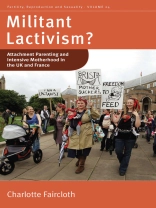Following networks of mothers in London and Paris, the author profiles the narratives of women who breastfeed their children to full term, typically a period of several years, as part of an ‘attachment parenting’ philosophy. These mothers talk about their decision to continue breastfeeding as ‘the natural thing to do’: ‘evolutionarily appropriate’, ‘scientifically best’ and ‘what feels right in their hearts’. Through a theoretical focus on knowledge claims and accountability, the author frames these accounts within a wider context of ‘intensive parenting’, arguing that parenting practices – infant feeding in particular – have become a highly moralized affair for mothers, practices which they feel are a critical aspect of their ‘identity work’. The book investigates why, how and with what implications some of these mothers describe themselves as ‘militant lactivists’ and reflects on wider parenting culture in the UK and France. Discussing gender, feminism and activism, this study contributes to kinship and family studies by exploring how relatedness is enacted in conjunction to constructions of the self.
قائمة المحتويات
List of Illustrations
List of Tables
Foreword
Acknowledgments
Introduction
PART I: THE CONTEXT OF CONTEMPORARY MOTHERING
Chapter 1. Intensive motherhood and identity work
- An anthropology of parenting?
- Parenting and/as kinship
- The UK context
- Intensive mothering
- Intensive motherhood: ‘Local moral world’
- Historicising intensive motherhood
- Mothering as identity work: Narrative processes of self-making
Chapter 2. Infant feeding and intensive motherhood
- Breastfeeding
- The scientific case for breastfeeding
- The context of infant feeding 1900-present
- Infant feeding and policy
- Choosing to breastfeed: Informed choice?
- Infant feeding and maternal identity
PART II: LA LECHE LEAGUE
Chapter 3. Contextualising ‘full-term’ breastfeeding
- La Leche League
- Research sample
- Demographic profile: Who comes to LLL meetings?
- Non-participant observation
- Accounts
- Experiences
- Case-study
- Contextualising full-term breastfeeding
- Breastfeeding, body boundaries and individuality
- Defence strategies
Chapter 4. La Leche League: Philosophy and community
- A typical meeting
- La Leche League’s philosophy
- The founding of LLL Great Britain (LLLGB)
- Paradoxes of appeal
- LLL and attachment parenting
- LLL for all mothers?
Chapter 5. ‘Finding my tribe’
- Why do people come to La Leche League meetings?
- ‘Finding my tribe’
- Norms
- La Leche League as purposeful network
- Norms
- Activism
- Resistance
PART III: ACCOUNTING FOR FULL-TERM BREASTFEEDING
Chapter 6. ‘It’s natural’: some cultural contradictions
- Types of natural: Some accounts
- Natural parenting
- Evolutionary narratives: Primates and ‘primitives’
- ‘Natural’ mothering: Feminism and fathers
- Cultural contradictions of going natural
- A return to anthropology?
- Postscript
Chapter 7. ‘What science says is best’: Science as dogma
- The scientific claim for full-term breastfeeding and attachment parenting
- Psychological evidence
- Neuroscience: ‘Real evidence’
- ‘The Science’
- ‘The Science’ and ‘informed choice’
Chapter 8. ‘What feels right in my heart’: Hormones, morality and affective breastfeeding
- Because of the hormones: ‘It feels right’
- Affective breastfeeding
- Instinct and intuition: Some contradictions
- Agency when you ‘just know’
- A moral good?
- Affect sensuality and breastfeeding
- Non-nutritive sucking, or, The affective residue
PART IV: CONTEXTUALISING INTENSIVE MOTHERHOOD
Chapter 9. Mothering as identity work in cross-cultural perspective: The case of France
- Making selves: Separation and attachment
- Paris: A comparison
- LLL France
- Doubled reflexivity
- French parenting: Non-intensive motherhood?
- It’s natural? Feminism and (full-term) breastfeeding in France
- ‘Réunions à théme’: Attachment mothers in Paris
- Expressing milk: The French way?
Conclusion
Appendices
Appendix I: Short term and long-term health benefits of breastfeeding for the child and mother in developed countries
Appendix II: Summary of demographic results from questionnaire responses
Notes
References
Index
عن المؤلف
Charlotte Faircloth is Associate Professor of Social Science in the UCL Social Research Institute, UK.












